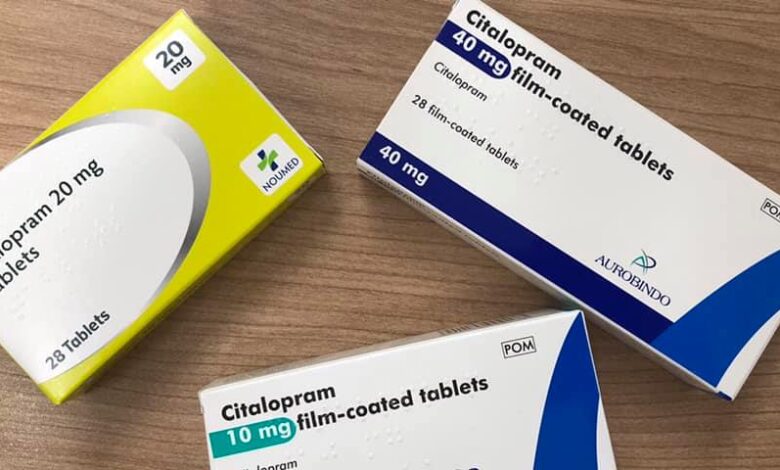Citalopram: Uses, Side Effects, Addiction

Citalopram, sold under the brand name Celexa among others belongs in a class of antidepressants called selective serotonin reuptake inhibitors (SSRIs). It is thought to work by increasing the amount of serotonin, a natural substance in the brain that helps maintain mental balance. It is used to treat major depressive disorder, obsessive compulsive disorder, panic disorder, and social phobia. The antidepressant effects may take one to four weeks to occur.
Citalopram is a drug that is known to be abused but it is available by prescription only, which means that access to it is controlled. However, it is not considered to be a controlled substance.
How should Citalopram be used?
Citalopram comes as a tablet and a solution (liquid) to take by mouth. It is usually taken once a day, in the morning or in the evening, with or without food. Take citalopram at around the same time every day. Follow the directions on your prescription label carefully, and ask your doctor or pharmacist to explain any part you do not understand. Take citalopram exactly as directed. Do not take more or less of it or take it more often than prescribed by your doctor.
Your doctor may start you on a low dose of citalopram and gradually increase your dose, not more often than once a week.
It may take 1 to 4 weeks before you notice the full benefit of citalopram. Continue to take citalopram even if you feel well. If you suddenly stop taking citalopram, you may experience withdrawal symptoms such as mood changes, irritability, agitation, dizziness, numbness, tingling or electric shock-like sensations in the hands or feet, anxiety, confusion, headache, tiredness, nausea, sweating, shaking, and difficulty falling asleep or staying asleep. Do not stop taking citalopram without talking to your doctor. Your doctor will probably decrease your dose gradually.
Other uses for this medicine
Citalopram is also sometimes used to treat eating disorders, alcoholism, panic disorder (condition that causes sudden attacks of extreme fear with no apparent cause), premenstrual dysphoric disorder (a group of physical and emotional symptoms that occur before the menstrual period each month), and social phobia (excessive anxiety about interacting with others). Talk to your doctor about the possible risks of using this medication for your condition.
This medication may be prescribed for other uses; ask your doctor or pharmacist for more information.
What side effects can this medication cause?
Citalopram may cause side effects. Tell your doctor if any of these symptoms are severe or do not go away:
- nausea
- diarrhea
- constipation
- vomiting
- stomach pain
- heartburn
- decreased appetite
- weight loss
- frequent urination
- excessive tiredness
- yawning
- weakness
- uncontrollable shaking of a part of the body
- muscle or joint pain
- dry mouth
- changes in sex drive or ability
- heavy menstrual periods
Some side effects can be serious. If you experience any of the following symptoms call your doctor immediately or get emergency medical treatment:
- chest pain
- shortness of breath
- dizziness
- fainting
- fast, slow, or irregular heartbeat
- hallucinating (seeing things or hearing voices that do not exist)
- fever
- excessive sweating
- confusion
- coma (loss of consciousness)
- loss of coordination
- stiff or twitching muscles
- hives or blisters
- rash
- itching
- difficulty breathing or swallowing
- swelling of the face, throat, tongue, lips, eyes, hands, feet, ankles, or lower legs
- hoarseness
- unusual bleeding or bruising
- headache
- unsteadiness
- problems with thinking, concentration, or memory
- seizures
Citalopram may decrease appetite and cause weight loss in children. Your child’s doctor will watch his or her growth carefully. Talk to your child’s doctor if you have concerns about your child’s growth or weight while he or she is taking this medication. Talk to your child’s doctor about the risks of giving citalopram to your child.
Citalopram may cause other side effects. Call your doctor if you have any unusual problems while taking this medication.
Citalopram Safety Information
A small number of children, teenagers, and young adults (up to 24 years of age) who took antidepressants (‘mood elevators’) such as citalopram during clinical studies became suicidal (thinking about harming or killing oneself or planning or trying to do so). Children, teenagers, and young adults who take antidepressants to treat depression or other mental illnesses may be more likely to become suicidal than children, teenagers, and young adults who do not take antidepressants to treat these conditions. However, experts are not sure about how great this risk is and how much it should be considered in deciding whether a child or teenager should take an antidepressant. Children younger than 18 years of age should not normally take citalopram, but in some cases, a doctor may decide that citalopram is the best medication to treat a child’s condition.
You should know that your mental health may change in unexpected ways when you take citalopram or other antidepressants even if you are an adult over 24 years of age. You may become suicidal, especially at the beginning of your treatment and any time that your dose is increased or decreased. You, your family, or your caregiver should call your doctor right away if you experience any of the following symptoms: new or worsening depression; thinking about harming or killing yourself, or planning or trying to do so; extreme worry; agitation; panic attacks; difficulty falling asleep or staying asleep; aggressive behavior; irritability; acting without thinking; severe restlessness; and frenzied abnormal excitement. Be sure that your family or caregiver knows which symptoms may be serious so they can call the doctor if you are unable to seek treatment on your own.
Your healthcare provider will want to see you often while you are taking citalopram, especially at the beginning of your treatment. Be sure to keep all appointments for office visits with your doctor.
The doctor or pharmacist will give you the manufacturer’s patient information sheet (Medication Guide) when you begin treatment with citalopram. Read the information carefully and ask your doctor or pharmacist if you have any questions. You also can obtain the Medication Guide from the FDA website: http://www.fda.gov/Drugs/DrugSafety/ucm085729.htm.
No matter your age, before you take an antidepressant, you, your parent, or your caregiver should talk to your doctor about the risks and benefits of treating your condition with an antidepressant or with other treatments. You should also talk about the risks and benefits of not treating your condition. You should know that having depression or another mental illness greatly increases the risk that you will become suicidal. This risk is higher if you or anyone in your family has or has ever had bipolar disorder (mood that changes from depressed to abnormally excited) or mania (frenzied, abnormally excited mood), or has thought about or attempted suicide. Talk to your doctor about your condition, symptoms, and personal and family medical history. You and your doctor will decide what type of treatment is right for you.




